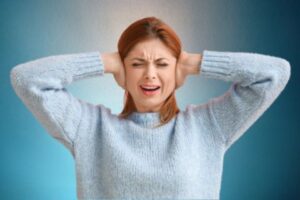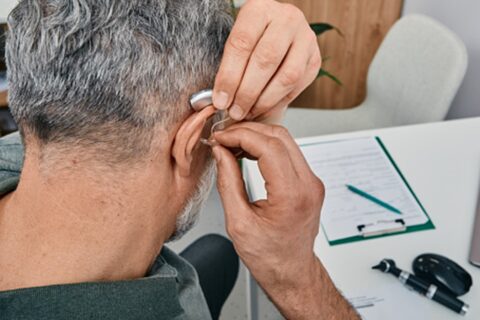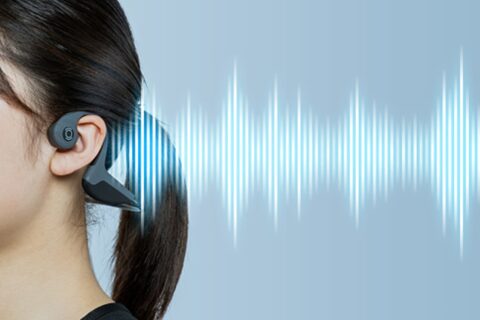Understanding Tinnitus

Tinnitus: “Ringing in the Ear”
Nearly everyone has experienced temporary tinnitus – the perception of sound when there is no actual sound – but for millions of Americans, it’s a chronic condition. While not dangerous, for many, it can negatively affect their quality of life.
Tinnitus (TIN-i-tiss or tin-EYE-tiss) can occur in one of both ears and can be intermittent or constant. It may or may not be associated with hearing loss. It is often described as a ringing in the ear, but it also presents as a low-pitch moan, a soft motor-type sound, a high-pitched squeal, or a pulsing heartbeat. Tinnitus that sounds like a heartbeat in your ear is called “pulsatile tinnitus”. Because this may be related to cardiovascular disease, narrowed arteries, or a vascular tumor you should consult a physician as soon as possible for evaluation.
Causes of Tinnitus
There are two types of tinnitus – primary and secondary. In primary tinnitus, there is no known cause. In secondary tinnitus, the symptom is a result of another underlying condition.
Secondary tinnitus can be caused by:
- Injury to the ear – such as trauma to the head or ear or injury to the tiny parts of the inner ear from excessively loud noise
- Ear infections
- Wax build-up
- Medications, including aspirin and acetaminophen in high doses, and certain diuretics and antibiotics can damage inner ear hair cells and cause tinnitus
- An abnormality in the ear or the hearing portion of the brain, such as a benign tumor called an acoustic neuroma, or a growth called otosclerosis
- Temporomandibular joint disorder (TMJ)
- Meniere’s disease
- Lifestyle factors, including depression, anxiety, insomnia, and muscular stress and fatigue may lead to, or exacerbate, tinnitus.
Preventing Tinnitus
Exposure to very loud noises is a major cause of tinnitus that can be prevented. Noise is measured in decibels (dB). Long or repeated exposure to sounds at or above 85 dB can cause damage the nerve cells that translate sound waves into sound.
To better understand safe sound levels, consider the decibels of the following common sounds:
30 dB = whisper, quiet library
60 dB = typical conversation, dishwasher, clothes dryer
94 dB = hair dryer, kitchen blender, food processor
112 dB = rock concert, chainsaw
130 dB = jackhammer
Tips for reducing your exposure to loud noise include:
- Know which noises are at or above 85 dBA and limit your exposure to them
- Wear earplugs or other protective devices when exposed to loud noise
- If you can’t reduce the noise or protect yourself from it, move away from it
- Have your hearing tested on a regular basis if you are frequently exposed to loud noise
Visit the American Speech-Language-Hearing Association for more information on reducing your exposure to loud noise and protecting your hearing.
Treatments for Tinnitus
If you are experiencing tinnitus, you should visit your Florida Gulf Coast Hearing Center and our ENT team to determine the severity and type of your tinnitus. Before your visit, complete our Tinnitus Reaction Questionnaire to help us assess your symptoms.
With secondary tinnitus, treating the condition that causes tinnitus may eliminate or reduce tinnitus. With primary tinnitus where there is no known cause, your physician can recommend tips for reducing the effect, including:
- Reduce or eliminate your caffeine consumption
- Hearing aids may help provide relief from tinnitus by making sounds louder and the tinnitus less noticeable
- Sound generators produce and deliver soothing sounds to your ears that can quiet the tinnitus
- Relaxation techniques to reduce any stress and frustration that may make tinnitus more noticeable
- Mental wellness therapies like cognitive behavioral therapy (CBT) or acceptance and commitment therapy (ACT) can help people learn how to pay less attention to tinnitus.
Learn more about tinnitus, including FAQ’s and facts, on our tinnitus web page.
Tinnitus Treatment in Southwest Florida
With offices in Naples and Estero, Florida Gulf Coast Hearing Center serves patients with hearing loss in Naples, Estero, Bonita Springs, Fort Myers, Lely, Belle Meade, Vineyard, Vanderbilt Beach Estates, Orangetree, Council, Marco Island, and beyond. Our team of physicians and audiologists will perform a thorough exam and testing to determine the type and cause of your tinnitus, as well as treatment options. Contact us today for an appointment.


